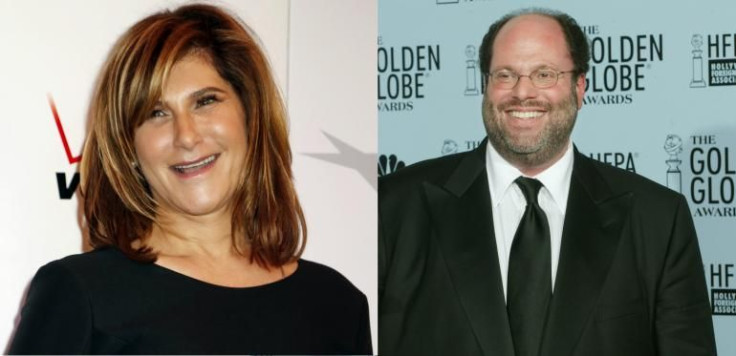How Do Amy Pascal And Scott Rudin Recover From Sony Email Leak? A Crisis Management Expert Weighs In

It's not been a great week for Sony co-chair Amy Pascal and producer Scott Rudin. The Sony Pictures hacking scandal, which began shortly before Thanksgiving, has resulted in leaks of the company's sensitive information, including the salaries of Sony execs and employees' social security numbers, and in recent days, embarrassing private emails between Pascal and Rudin that have featured insulting communications about Angelina Jolie, Annapurna's Megan Ellison, and even President Obama have surfaced.
In the Obama exchange, reported by BuzzFeed, Pascal and Rudin joke about what films the president would like, and begin bantering about films featuring black actors and even slave-themed storylines.
"Should I ask him if he liked DJANGO?" asks Pascal, to which Rudin responds, "12 YEARS," referring to "12 Years a Slave." Pascal continues,“Or the butler. Or think like a man? [sic]” The emails were slammed as racist, and prompted Rev. Al Sharpton to describe the exchange as "offensive, insulting" and reflecting a "troubling" lack of diversity at Sony, reports the New York Times.
Pascal and Rudin have since made public apologies, but Jonathan Bernstein, President of Bernstein Crisis Management,was not impressed. Hollywood is a relationship town. Now that Pascal and Rudin have managed to offend half of the talent glitterati, how are they going to recover? Not only will awards season be interesting -- expect some awkward air kisses -- but perhaps real projects will fall apart over rivalries and hurt feelings.
IBTimes: What can Pascal and Rudin do now?
Bernstein: Realistically, they need to listen to the people most impacted by their statements. They don’t need to focus on public opinion but what the effect on their stakeholders was. Based on the answers they get, they then need to proceed with humility and discretion.
IBTimes: Should they also write private letters to the people they insulted?
Bernstein: I hope they do!
IBTimes: What did you think of their apologies?
Bernstein: Rudin and Pascal’s apologies were qualified, which reduced the perceptions that they were sincere. What they could have said was something like, "I need to revisit my attitudes." Black actors weren’t surprised that Hollywood players are racist. Just look at "Exodus" and the all-white cast. Unfortunately, they [Rudin/Pascal] have done damage not only to their reputations, but the reputation Hollywood has around race.
[According to the New York Times, the apologies included the following: “The content of my emails to Scott were insensitive and inappropriate," wrote Pascal, "but are not an accurate reflection of who I am. Although this was a private communication that was stolen, I accept full responsibility for what I wrote and apologize to everyone who was offended.” Rudin issued the following apology: “To anybody I’ve offended, I’m profoundly and deeply sorry, and I regret and apologize for any injury they might have caused," he wrote. "I made a series of remarks that were meant only to be funny, but in the cold light of day, they are in fact thoughtless and insensitive — and not funny at all.”]
IBTimes: What's a Hollywood example of an abject failure in crisis management?
Bernstein: Mel Gibson: Failure. His attempts at an apology and making amends could be considered an abject failure. And I’m pretty sure it's since affected his career. His apology came across as defensive and insincere, along the lines of "Some of my best friends are Jewish." You’re better off delaying your apology or not making one at all than making an insincere apology. Arrogance seems to go along with the expression of bigotry.
IBTimes: Have you worked with celebrities?
Bernstein: I don’t really work with celebrities or politicians. I have, but they don’t take your advice, and their egos usually get in the way. I turned down Donald Sterling’s people. They weren’t looking for crisis management; they were looking for spin. There's a misconception that that’s what we do, that we’re spin doctors and that we’re going to spin their problems away. I’m more ethical than that. There’s no amount of money that will get me to spin a story like Sterling’s. They wanted me to spin the story about the girl who turned him in.
If Donald had just called and said, "Hey, I’ve been an asshole," I might have talked to him, but that’s not what happened.
Bipolar 28 year old lunatic..? I always thought of myself more as eccentric. pic.twitter.com/EYKyXOGUEb
— Megan Ellison (@meganeellison) December 10, 2014© Copyright IBTimes 2024. All rights reserved.






















